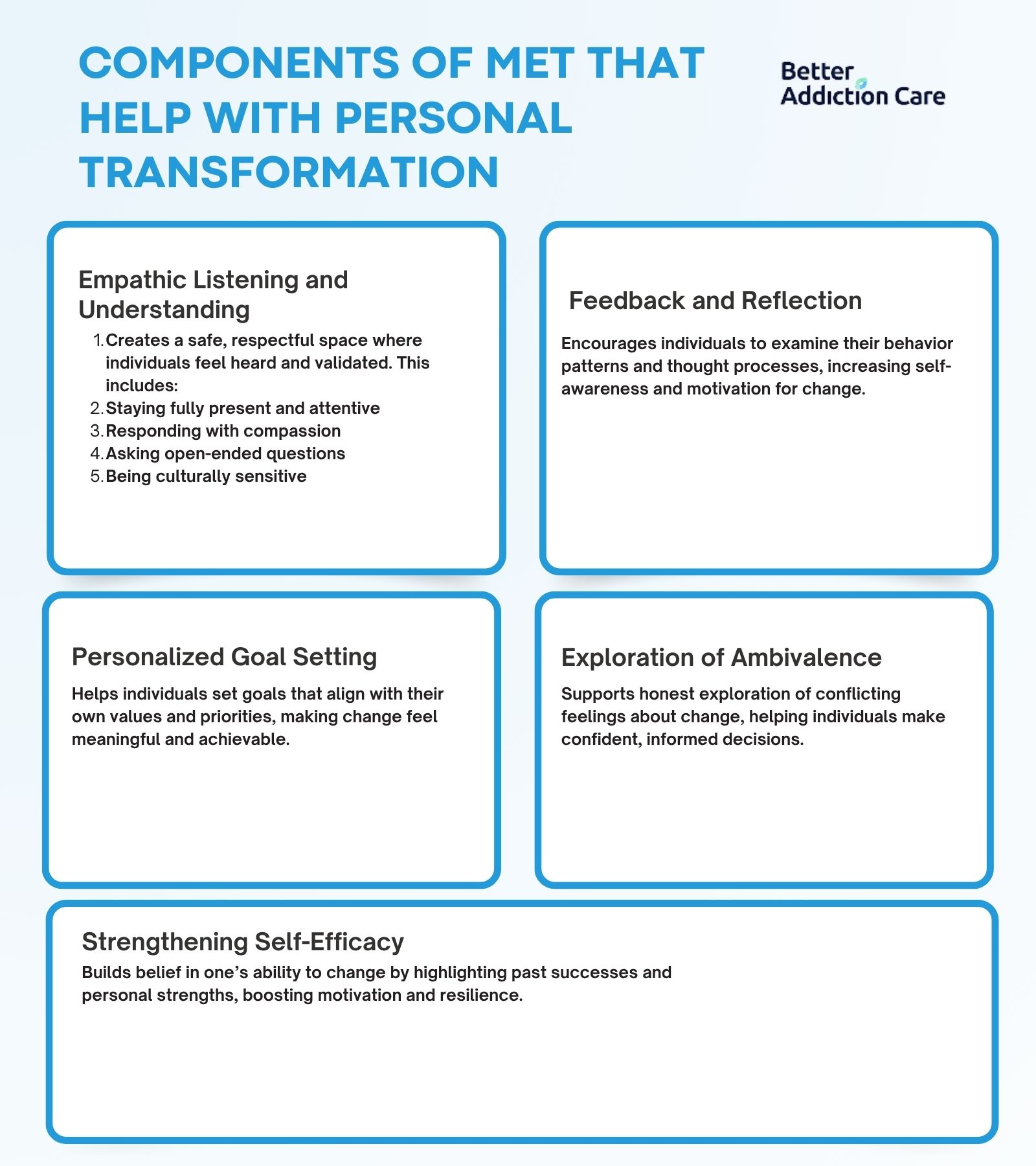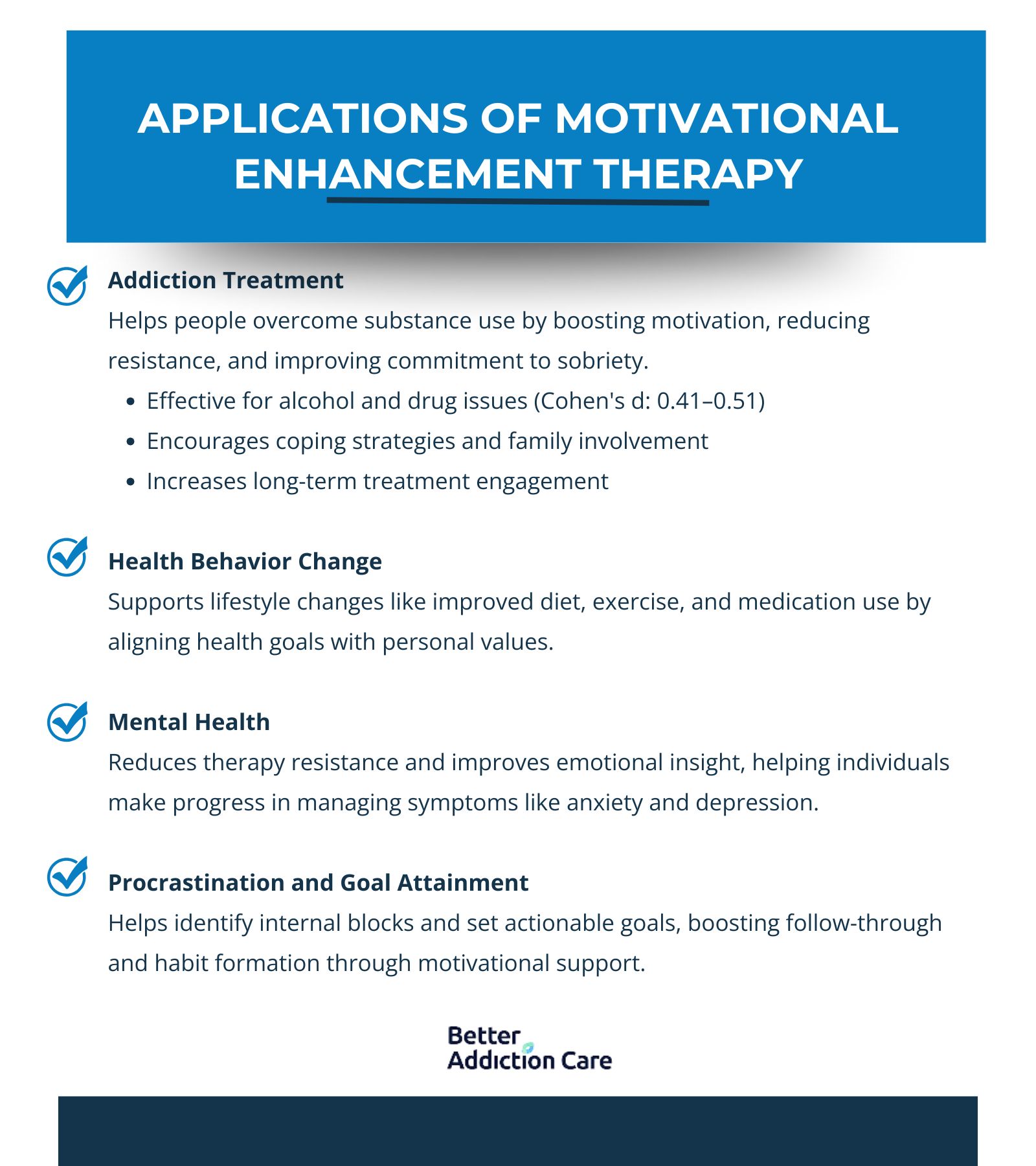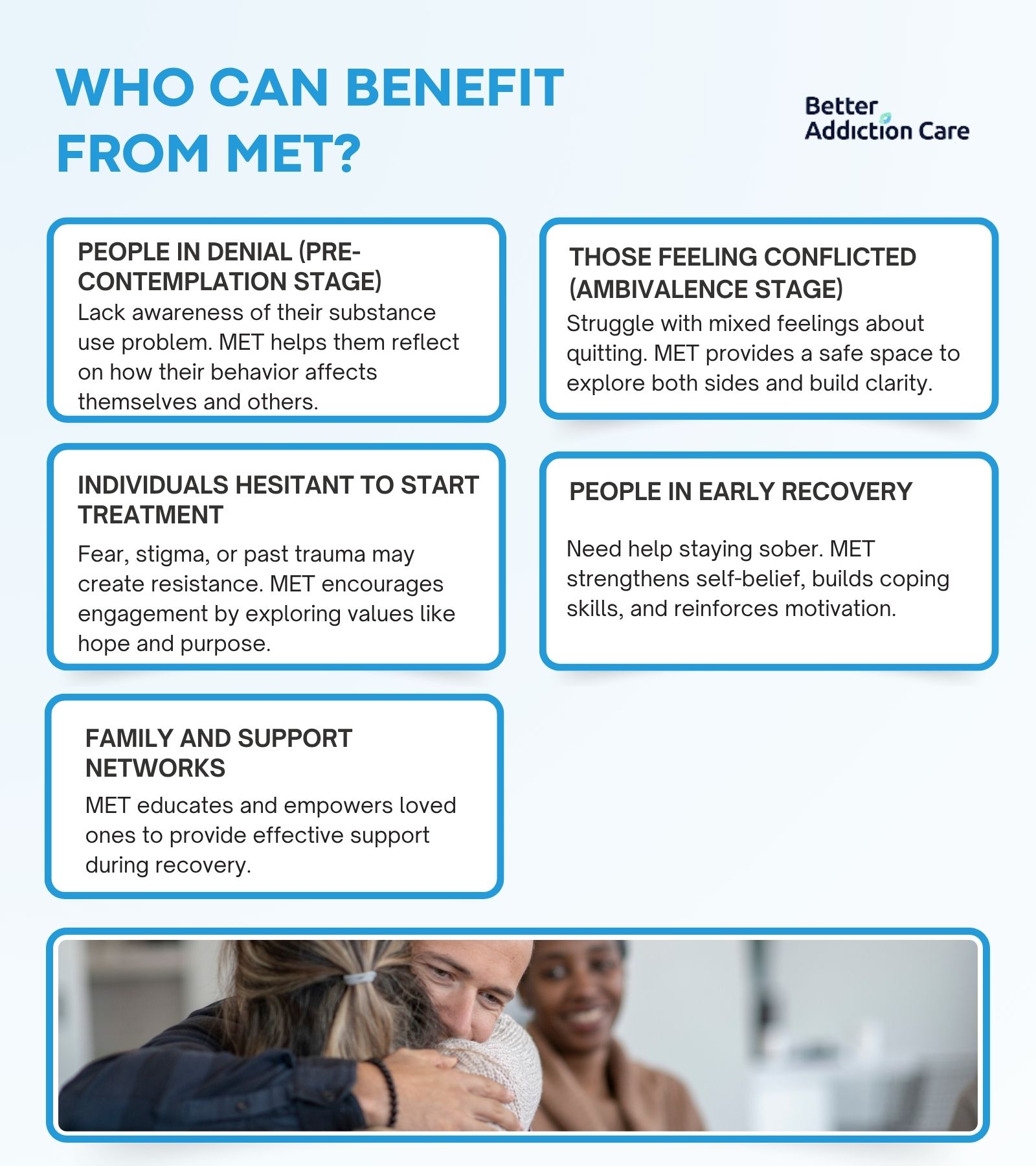Motivational Enhancement Therapy as a Way to Reach Personal Transformation
Motivational Enhancement Therapy (MET) is a person-centered intervention that fosters internal motivation for change. It assists individuals facing substance use issues through empathic listening, introspective questioning, and constructive feedback.

Motivational Enhancement Therapy (MET) is a person-centered intervention that fosters internal motivation for change. It assists individuals facing substance use issues through empathic listening, introspective questioning, and constructive feedback.
Key components include compassionate communication, individualized goal setting, and confidence building, creating a supportive framework for exploring motivations.
MET applies to addiction treatment, health behavior change, and mental health, benefiting those in pre-contemplation, ambivalence, early recovery, and their support systems. It clarifies values, strengthens self-efficacy, and improves coping strategies, helping prevent relapse.
According to Kumar, S.’s 2021 study, ‘Effect of Motivational Enhancement Therapy (MET) on the self efficacy of Individuals of Alcohol dependence’, those receiving MET sessions alongside standard treatment showed significant improvement in self-efficacy scores, increasing from 56.30 to 60.75 points, while the control group showed minimal change (56.25 to 57.30 points). This substantial increase in self-efficacy is crucial for maintaining long-term recovery and preventing relapse.
What is Motivational Enhancement Therapy (MET)?
Motivational enhancement therapy is a person‑centered intervention designed to spark internal motivation for change in individuals struggling with substance use or other difficult behaviors. According to Better Addiction Care, MET uses empathic listening, introspective questioning, and constructive feedback to help people overcome hesitation and ambivalence.
What Are The Key Components of MET That Help With Personal Transformation?

The key components of MET that help with personal transformation include compassionate communication, constructive feedback processes, individualized objective setting, ambivalence resolution, and confidence building. These foundational elements work together to create a supportive framework where individuals explore their motivations, address internal conflicts, and develop the skills needed for meaningful change.
Here are the key components of MET that help with personal transformation:
Empathic Listening and Understanding
Empathic listening builds trust and encourages honest self-reflection. MET uses a supportive, non-judgmental environment where individuals feel safe to express thoughts and emotions. This deep understanding allows people to feel heard, which strengthens their ability to face challenges and make meaningful changes.
-
Presence and Attention: Staying fully present and attentive helps individuals feel respected and validated.
-
Empathic Responses: Using verbal and nonverbal cues shows compassion and improves emotional connection.
-
Exploration and Clarification: Asking open-ended questions and clarifying feelings leads to deeper self-awareness.
-
Cultural Sensitivity: Recognizing personal and cultural differences supports more effective and respectful communication.
Empathic listening is foundational in MET because it creates a strong therapeutic bond, which empowers individuals to move forward with clarity and confidence.
Feedback and Reflection
Feedback and reflection help individuals recognize patterns in thoughts, feelings, and behaviors. MET encourages people to examine these patterns openly and constructively, allowing them to take ownership of their actions and shift their mindset. Reflecting on both strengths and areas of struggle increases insight and supports intentional change.
Personalized Goal Setting
Personalized goal setting gives direction to the transformation process. In MET, goals are based on the individual’s own values, not imposed by the therapist. This collaborative process helps define clear, realistic steps that align with the person’s deeper motivations and life priorities.
Exploration of Ambivalence
Exploring ambivalence helps individuals resolve inner conflicts that block progress. MET acknowledges that people feel pulled in different directions. Instead of pushing for change, it helps individuals examine both sides of their thinking so they make clear, confident decisions.
Strengthening Self-Efficacy
Strengthening self-efficacy increases a person’s belief in their ability to succeed. MET helps individuals recall past successes and recognize their personal strengths. This confidence boost encourages consistent effort and builds resilience when facing obstacles, which is key for lasting transformation.
What Are The Applications of Motivational Enhancement Therapy?

The applications of motivational enhancement therapy include substance abuse recovery support, behavioral modification techniques, psychological wellness enhancement, and personal development strategies.
Here are the common applications of MET:
Addiction Treatment
MET is used to treat addiction by increasing motivation, reducing resistance, and supporting long-term recovery. According to Crits-Christoph, P.’s 2009 study, ‘The Alliance in Motivational Enhancement Therapy and Counseling as Usual for Substance Use Problems’, 94% of participants in MET studies met the diagnostic criteria for substance abuse or dependence, primarily related to alcohol and/or cocaine. The study also revealed that MET exhibits moderate effectiveness, with Cohen's d values of 0.41 for alcohol use problems and 0.51 for illicit drug use problems.
It helps individuals commit to sobriety by exploring personal reasons for change, building confidence, and teaching coping strategies to manage cravings and stress. MET also improves treatment engagement and strengthens support systems by involving family members in the recovery process.
Health Behavior Change
MET is applied in health behavior change by helping individuals make lasting improvements in areas like diet, exercise, and medication adherence. It connects health goals to personal values, making change more meaningful and sustainable.
Mental Health
MET supports mental health by reducing resistance to therapy and increasing self-awareness. It encourages people to engage more fully in treatment, leading to better emotional understanding, fewer symptoms, and stronger therapeutic progress.
Procrastination and Goal Attainment
MET addresses procrastination by helping individuals identify what holds them back and define clear, personal goals. It provides structure and motivation to take consistent action, making it easier to build better habits and follow through on commitments.
Who Can Benefit from MET?

Individuals in pre-contemplation stages, those experiencing ambivalence about recovery, people seeking motivation for treatment engagement, individuals in early recovery, and family members with support systems benefit from MET. Motivational enhancement therapy helps those in denial phases, people experiencing conflicting emotions about sobriety, individuals hesitant to seek professional help, early recovery participants, and loved ones supporting someone's journey.
Here are the individuals who benefit from MET:
-
Individuals in the Pre-Contemplation Stage: Many individuals begin their journey with a limited understanding of substance abuse and its effects. This denial stage, known as the "pre-contemplation stage," lacks awareness of the consequences. MET acts as an incentive for you to reflect on how your actions impact those around you.
-
Those Experiencing Ambivalence: Addiction recovery presents challenges, with ambivalence as a significant issue. This emotional struggle involves conflicting desires to achieve sobriety while grappling with the benefits of substance use. MET provides a secure environment for you to address these conflicting feelings, recognizing that opposing intentions and beliefs exist.
-
Individuals Seeking Motivation for Treatment Engagement: Stigma, self-criticism, and past trauma prevent many individuals from pursuing professional intervention. MET establishes a common language to foster an active therapeutic relationship. MET helps you explore your faith, hope, and purpose, creating a strong foundation for abstaining from substance abuse.
-
Those in Early Recovery: MET supports individuals on their recovery journey by enhancing self-efficacy, improving coping skills, and reigniting self-motivation. This process empowers you to confidently say "no" to temptations and triggers.
-
Family Members and Support Systems: Family members and support systems play a crucial role in the recovery process, benefiting from MET's insights and strategies to support their loved ones effectively.
How Does MET Enable Transformation Beyond Addiction Recovery?
Motivational enhancement therapy enables transformation beyond addiction recovery by helping individuals clarify their values, set personal goals, and strengthen their internal drive for positive change. It encourages deep self-reflection, allowing people to understand what truly matters to them beyond quitting substances. By building self-efficacy and resolving inner conflict, MET supports growth in areas like relationships, work, health, and emotional well-being. The therapy's focus on personal choice and accountability leads to sustainable behavior change. As individuals progress, they develop skills to face life challenges with confidence, which lays the foundation for long-term personal development and life fulfillment.
How Does MET support sober living transitions?
Can Motivational Enhancement Therapy Prevent Relapse Triggers?
Motivational enhancement therapy helps prevent relapse triggers by improving self-awareness and building coping strategies. It trains individuals to recognize emotional, social, and environmental cues that could lead to substance use. Through personalized feedback and goal setting, individuals learn to reflect on past behaviors and plan for future challenges.
This approach supports long-term behavior change by reinforcing internal motivation and readiness. Therapists guide clients in identifying risky situations and developing action plans to stay on track without caving into substance abuse triggers. With consistent application, MET reduces the chances of returning to harmful patterns by strengthening commitment and confidence in recovery goals.
How Does Motivational Enhancement Therapy Help Veterans Overcome Addiction Barriers?
Motivational enhancement therapy helps veterans overcome addiction barriers by addressing emotional conflict, mistrust, and low motivation. Veterans dealing with trauma or guilt sometimes hesitate to seek help. MET creates a supportive environment where they feel heard without judgment. It focuses on exploring personal values and goals to build the desire for change. This method respects individual pace and readiness, which helps veterans in drug rehab stay engaged. By building self-efficacy and resolving internal resistance, MET supports better decision-making and long-term progress. Therapists use strategies tailored to veterans’ experiences, which help them reconnect with purpose and regain control over their recovery.
How To Find Rehab Facilities That Provide Motivational Enhancement Therapy?
To find rehab facilities that provide motivational enhancement therapy, begin by searching for programs that specifically list MET or motivational interviewing in their treatment descriptions. Contact facilities directly to confirm availability and verify that licensed professionals provide this evidence-based therapy.
Check both inpatient and outpatient options depending on your needs. Look for centers with experience treating your specific substance use situation and any co-occurring disorders. National treatment directories and addiction registries help identify facilities using evidence-based approaches like MET.
Better Addiction Care provides comprehensive support to guide you toward the ideal treatment center for your unique situation. Use our local drug rehab locator to find qualified facilities offering motivational enhancement therapy, or call our 24/7 support line at (888) 766-0149 for personalized assistance in finding the right path to recovery.
Common Questions About Motivational Enhancement Therapy as a Way to Reach Personal Transformation
Motivational interviewing (MI) is a style of communication that helps empower clients through a natural process of change. It is done through good listening and giving respectful advice and suggestions. MI employs a much broader therapeutic approach. Contrastingly, MET focuses more on the client and includes an emphasis on personalized assessments, feedback, and plans to change their drug use.
MET is not a type of psychotherapy– it is simply a person-centered counseling approach meant to motivate positive change in a person struggling with substance use.
MET is effective for some people who struggle with substance or alcohol use disorders but not all. It can increase readiness to change and stop drug use. It is also effective for adolescents due to its non-confrontational and nonjudgmental therapy style.



